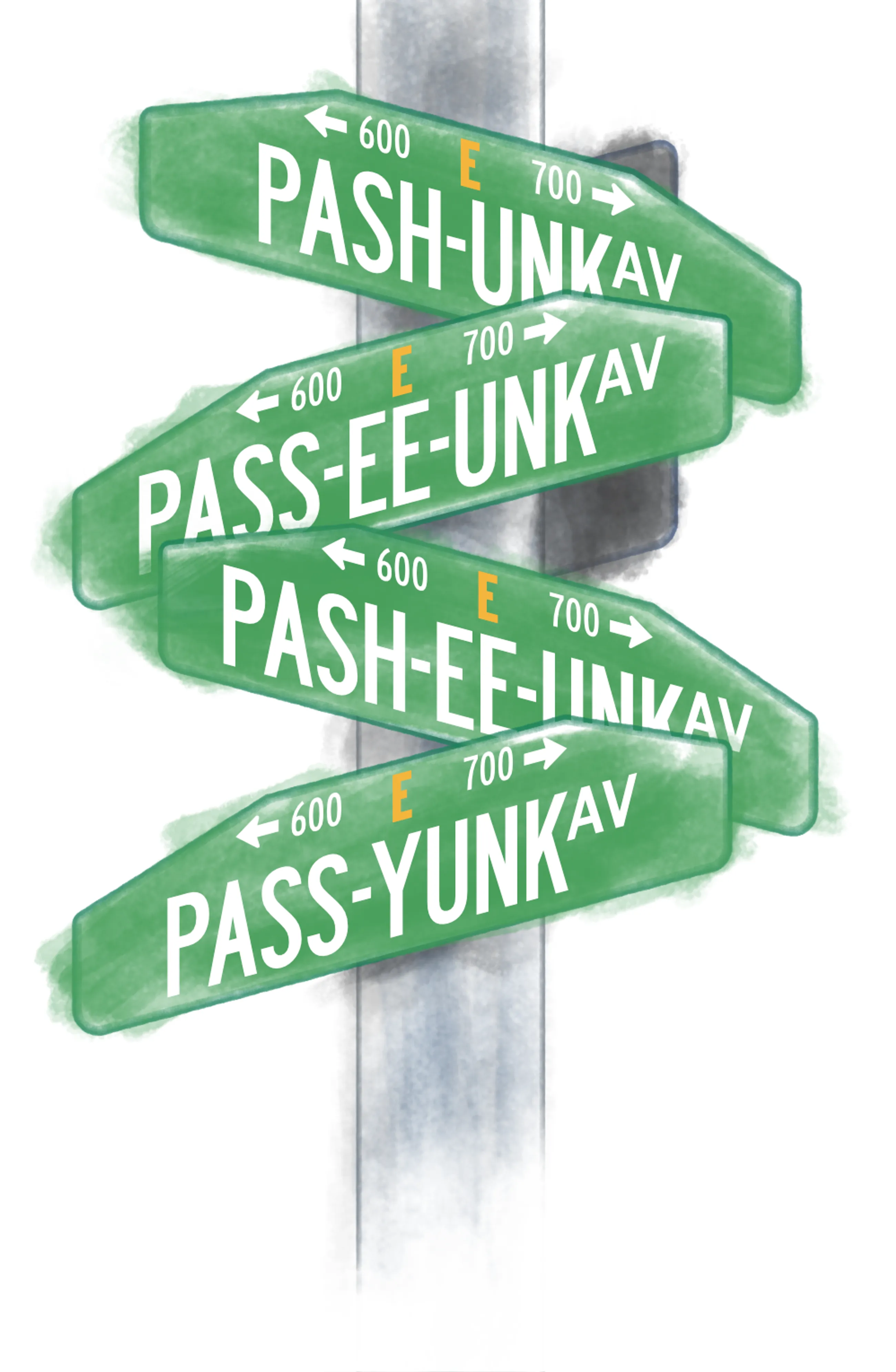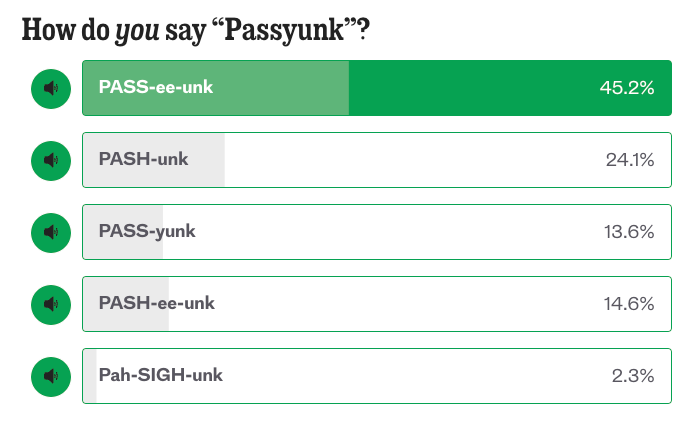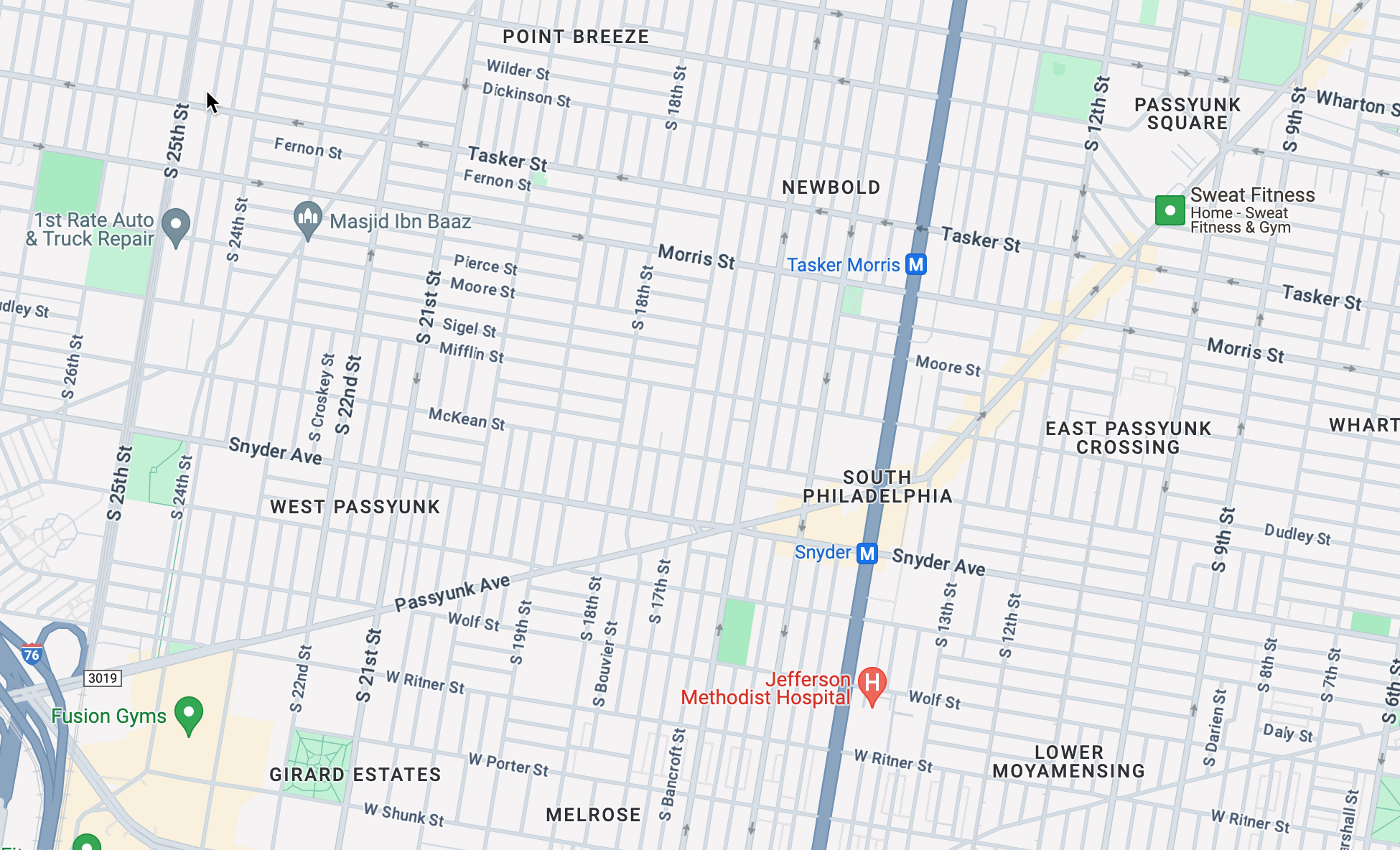Passyunk
« previous post | next post »
Zoe Greenberg, "Are we saying 'Passyunk' wrong?", The Philadelphia Inquirer, 4/23/2024:
 In this time of widespread division and chaos, The Inquirer decided to unite all Philadelphians by documenting the definitive way we pronounce “Passyunk.” Were we motivated to act by a random New Yorker article confidently declaring this word is pronounced “‘passion’ with a ‘k’”? Absolutely. But our quest grew far beyond that.
In this time of widespread division and chaos, The Inquirer decided to unite all Philadelphians by documenting the definitive way we pronounce “Passyunk.” Were we motivated to act by a random New Yorker article confidently declaring this word is pronounced “‘passion’ with a ‘k’”? Absolutely. But our quest grew far beyond that.
The effort left some of us, and those we interviewed, questioning who we were and what we know on a fundamental level. One woman interviewed by The Inquirer, for example, claimed to pronounce the word exactly the same as her husband, who proceeded to pronounce it completely differently.
The article offers a poll with five options:
The word Passyunk today is something of a defining Philadelphia word, much like the oft-discussed “wooder.” Linguists study dialects in part because they can become proxies for a whole range of seemingly unrelated information about a person, from age to race to gender. So… how do you say it?
The top choice was also my choice, FWIW.
The article explains that
“Passyunk” is the Lenape word for “in the valley (ies),” according to the Lenape Talking Dictionary, a digitized resource documenting the Southern Unami dialect of the Lenape people when they lived in what is now Philadelphia.
The original pronunciation was likely something like “pah-SIGH-unk,” said the Rev. J.R. Norwood, a former councilman and Supreme Court justice for the Nanticoke Lenni-Lenape Tribal Nation and a current delegate to the National Congress of American Indians.
When European colonists arrived in the area, the pronunciation of Lenape words was documented based on how the colonists heard and tried to pronounce them, Norwood said. That means that the “original” pronunciations of such words were not static, but changing even as they were recorded by Europeans. Some early maps spelled it in the Northern Umami dialect as “Pachsegink,” Norwood said.
[…]
In the 1650s, Passyunk covered an area along the Schuylkill down toward the Delaware, where more than 1,000 Lenape people lived, said Jean Soderlund, a retired history professor at Lehigh University and author of the book Lenape Country: Delaware Valley Society Before William Penn.
Disagreements persist:
These days, some South Philadelphians fiercely believe that true, lifelong South Philly residents say PASH-unk (We think this is what the New Yorker was referring to with its “passion with a k” bit). But that is not the case. Even veteran South Philadelphians say the word differently — sometimes with two syllables, sometimes with three, some with a “sh” in the middle and some without.
Suzanne Tavani, president of the Passyunk Square Civic Association, has lived in South Philadelphia her entire life. She is adamant that the neighborhood is pronounced PASS-ee-unk.
“My mother was always very keen to correct me if I dared say PASH-unk,” Tavani said. Her mother knew how to pronounce it because she was “not stupid,” Tavani said.
But Josephine Rettig, 95, was born in Bella Vista, lived here her entire life, and disagrees. She always said PASH-unk. She has never argued with anyone about the pronunciation because, first of all, it’s absolutely obvious.
“Who am I going to argue with? Myself?” Rettig asked as she shopped for groceries at the Acme on Passyunk Avenue. She was accompanied by Damita Belser, 45, her home health care aide and another lifelong Philadelphian. Belser grew up in North Philly and pronounces the avenue almost identically to Rettig: PASH-unk.
Yet down the street, Abdulageed Alkamel, the 27-year-old owner of Charlie grocery, says PASH-ee-unk.
The original mission to determine the definitive pronunciation proved impossible, as language and culture are dynamic, ever-evolving forces that have resulted in multiple “correct” pronunciations over thousands of years. We're forever bound to debate it.
When even devoted Philadelphians cannot agree, sometimes it’s best for non-Philadelphians to say nothing at all. Janice Sermania, co-owner of Sermania Jewelry on Passyunk Avenue, has noticed that silence is what out-of-state vendors often choose when they call to confirm the store’s delivery address.
They begin the word, but they rarely finish it.
“‘Pass’…” she said. “And they go, ‘Oh, this is a difficult one.’”
The map will show us Passyunk Avenue, West Passyunk, East Passyunk Crossing, Passyunk Square, etc.:


Walt Wolfram said,
April 29, 2024 @ 4:04 pm
I lived in Olney, left in 1958 at 17 and it was always and only PasseYUNK.Never heard pronounced anything else.
Jerry Packard said,
April 29, 2024 @ 5:30 pm
I lived in the Fluffya suburbs for 7 years, and my next door neighbor Claude — lifelong resident of the burbs and about 63 and straddling blue and white collar — said it pash-YUNK with stress on the 2nd syllable, while my wife and I (transplants) said it PASS-ee-yunk.
David L said,
April 29, 2024 @ 7:20 pm
Passaic, NJ, has the same origin, if Wikipedia is to be believed. Not that that helps with the Philly pronunciation.
Chas Belov said,
April 29, 2024 @ 7:42 pm
I left Philly at an early age without ever having heard it pronounced. I always mentally pronounced it when seeing it on a map as PASS-ee-yunk.
Steve Hartman Keiser said,
April 29, 2024 @ 8:12 pm
Add Pasadena, CA to the list of place names that trace back to words for "valley" from Algonquian languages. Basadinaa is Ojibwe and was apparently suggested as a place name on the west coast by white folks who moved there from the Great Lakes.
Victor Mair said,
April 29, 2024 @ 8:13 pm
Notice, from the trajectory of Pass-ee-unk Ave. on the map, that this street was conspicuously cockeyed from the get-go.
J.W. Brewer said,
April 29, 2024 @ 8:18 pm
Is this not one of the local lexemes where Labov et al. have 50+ years of good data showing pronunciation variations and their class/ethnicity/neighborhood correlates and how those correlations have shifted over time. I now realize I haven't been there since before the pandemic, but I do recommend this off-the-beaten-path cheesesteak place further out Passyunk than where tourists are usually found. https://www.phillymag.com/foobooz/2014/09/03/tale-tape-cheesesteak-philips-steaks/
Four decades removed from my Northern Delaware upbringing about 20 miles southwest of 23rd & Passyunk, I feel like I would at present go with the spelling pronunciation PASS-yunk, which is a distant third in the poll. But maybe if I heard people in my childhood saying #1 PASS-ee-yunk instead, that wasn't sufficiently distinct from PASS-yunk to register in my memory and remain there? I must have heard the word uttered on television and/or radio stations from Philadelphia, but I don't specifically recall e.g. some business located thereon where the pitchman was always reading out the address as part of his spiel in the commercials.
Ryan said,
April 30, 2024 @ 1:58 am
All good. But more importantly, do Philadelphians really write “vallies”. Bc the rest of us do not. It’s “valleys”.
J.W. Brewer said,
April 30, 2024 @ 8:04 am
Without prejudging the man, I would need to know a lot more about the Rev. J.R. Norwood and the non-federally-recognized group* with which he is affiliated than I suspect the Inquirer reporter did before treating him as an authoritative source. The good news is that the pronunciation he offers matches pretty closely the audio clip of the word you can find on the impressive Lenape Talking Dictionary site, but for all I know that's the basis for Norwood's knowledge. And in any event the "Talking Dictionary" generally offers the pronunciation of the last generational cohort of L1 speakers out in Oklahoma when they got tape-recorded in the 1960's et seq. It seems hazardous to presume no meaningful pronunciation changes between the 1680's (or even earlier?) when the toponym would have first been picked up by incoming Europeans and the time of those recordings. I don't know what sort of scholarship there is on sound change in Algonquian languages generally between first European contact and more modern times.
Here's an interesting interview with the fellow in charge of the Talking Dictionary project, who is an outsider but one who has been doing fieldwork on the language for a very very long time and is apparently trusted by the tribal authorities (for the federally-recognized tribe) out in Oklahoma. https://lithub.com/on-preserving-the-lenape-language-and-trying-to-get-face-time-with-an-nyc-mayor/ One interesting tidbit I did not previously know is that at least in Oklahoma, the endonym is simply "Lenape" and saying "Lenni-Lenape" (which I remember learning as a child) marks you as an outsider.
*His group is apparently recognized by the State of New Jersey, at least following the 2017 decision of that state's attorney general to settle a lawsuit regarding the group's status. There is ongoing and sometimes bitter controversy about tribes with state-but-not-federal recognition, with some claiming the federal criteria are too burdensome and restrictive and others claiming that the states often have poor judgment or quality control in deciding who to recognize and that certain state-recognized groups are, to quote a 2023 article in Native News Now, "nothing more than hobbyist groups that have gained state recognition with little–or no–actual Native American blood among their membership." I don't know anything specific about the bona fides of Norwood's group, and I don't think even the strongest critics assert that that's a fair description of every single state-recognized group out there.
Ken DeRosa said,
April 30, 2024 @ 12:12 pm
Now that that's settled we can move on to the definitive pronunciations of Oregon Ave, Moyamensing Ave, and Arkansas Ave (In AC).
Oracles said,
April 30, 2024 @ 2:49 pm
"Raymond Luxury Yacht".
Ed said,
May 1, 2024 @ 7:58 am
I've heard it both ways, but isn't going from PASS-ee-unk to PASH-unk just a common phonetic change? Shortening [si-V] to [ʃ-V] happens all the time in all kinds of languages.
Transplanted Philadelphian here, born in central PA, but my mom is Filipino, and that change happens with si-V words in Philippine languages as well.
Tom Dawkes said,
May 1, 2024 @ 3:42 pm
@J.W. Brewer on "sound change in Algonquian languages generally between first European contact and more modern times"
The International Journal of American Linguistics, to mention just one source, has numerous articles which trace sound changes over specified periods, and some of these reference texts (18th century or earlier) which record contemporary pronunciations (albeit imprecise) in Algonquian and Iroquoian languages.
Tom Dawkes said,
May 1, 2024 @ 3:48 pm
An example of an article dealing with early recordings of indigenous Iroquoianlanguages is Marianne Mithun's “Stalking the Susquehannocks.” International Journal of American Linguistics, vol. 47, no. 1, 1981, pp. 1–26. JSTOR, http://www.jstor.org/stable/1264630. Accessed 1 May 2024. This can be accessed for reading via a Google login.
Tom Dawkes said,
May 1, 2024 @ 3:48 pm
An example of an article dealing with early recordings of indigenous Iroquoian languages is Marianne Mithun's “Stalking the Susquehannocks.” International Journal of American Linguistics, vol. 47, no. 1, 1981, pp. 1–26. JSTOR, http://www.jstor.org/stable/1264630. Accessed 1 May 2024. This can be accessed for reading via a Google login.
Rose Eneri said,
May 2, 2024 @ 4:20 pm
I grew up in NE Philly and only ever heard this as PASS-ee-unk.